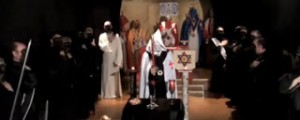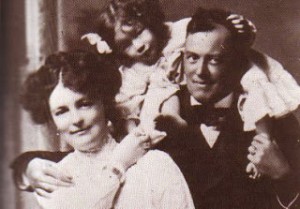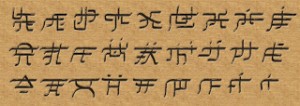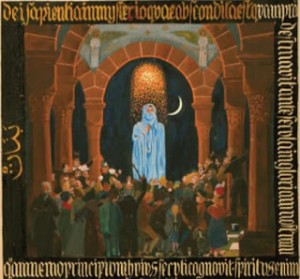
P: We don’t have a common way of working in our group now.
T: There isn’t a common mythos. We’re not claiming a single tradition just claiming insanity.
L: Again I really like the individuality of that. It makes for a creative tension.
T: A very exciting synthesis.
P: There’s nobody who wants to force their way of doings things onto everyone else.
C: Maybe we should all have tantrums next time.
T: Yes, a Tantrum Afternoon!
– Phil Hine, Prime Chaos
Believe it or not, Indianapolis, Indiana, is not a hot bed of occult activity. Admittedly, my admonishments of Crowley may have alienated me from some of the few practicing magicians in the area. Not to mention the very nature of the Art makes most magi hard to get along with. All of this works against me in my longing to practice with others.
I know of no structured surveys on the subject, but I would bet that the majority of magicians remain solitary. A small percentage of people I know occasionally participate in group rituals. Only the most hardcore OTO members seem to have group ritual on something of a regular basis. Being a chaos magician makes things that much worse. Not that I am saying the nature of chaos magick implies a lack of structure, only that its relative youth and few established organizations make it a lesser known practice.
As the old trope goes, if I had a dollar for every time I’ve heard someone say, “I feel like I am missing out because I don’t have a group to practice with,” I could buy myself a pretty nice dinner. Seldom do I hear, however, what exactly that person feels they are missing. While the experiential nature of magick does preclude some knowledge of what group ritual would provide, it does not stop a magician from speculating on what they want out of a group experience. A chaos magician, perhaps more so than others, should look at any endeavor as a means to get results.
As I dig deeper into the subject, and reflected on some of my recent breakthroughs, I feel I can provide a decent argument as to why practicing with others could lead to greater results. Most people cite the nebulous power of group “energy”, which may have some merit, but seems to lack concrete explanation. I would say, the benefit of group perception may be the true value of working with others. Most magi agree on the individual nature of perception. Every consciousness perceives reality in a different way based on their perspective. For example, many of us have met in our time people able to perceive things we do not. When we later witness events related to this perception, such as a stunningly accurate divination, we know that even though we did not perceive the phenomena related to the event, we know that they had a basis in reality.
Given this truth, working within a group gives a magician access to those who may perceive their results in different ways than the magician themselves. It’s foolish to believe that we can always detect every detail of our results. Wouldn’t it be invaluable to have input from others as to what they experienced?
Moving away from the self-centered model, it would of course be of great benefit to witness the results of more capable magicians. I do not believe in gurus. I also know that what may work for one person may not work for others. But that knowledge can still act as a springboard for your own practices. The danger lies in the folly of human nature, which sometimes drives us to adoration of those who seemingly can accomplish feats beyond our reach. This poses an even greater threat when it involves those who deal in miracles.
So with all these good reasons, here I am, still slogging away in solitude. The difficulties of geography and culture are no small obstacle. Yet, I have been able to participate in more than one local discussion group with people practicing in a similar style of my own. I know that two things hold me back. A fear of dedication, and a fear of intimacy.
I think most people can relate with the dedication hurdle. With all the time we already dedicate to our practice, adding the responsibilities of group participation seems daunting. But those things tend to be overcome once the benefits become readily apparent.
What holds me back more than anything is the difficulty in finding the “right” people. Magick involves sharing a great deal of ourselves. It would be foolish to give away that kind of knowledge to people are not already completely familiar with. Also, magick will often put you in delicate and intimate situations. You never know how people will react in that kind of environment, even ones you think you know well.
But here I sit, pouring this all out. Hoping that someone reading this lives close enough to contact me, and at least entertain the idea of working together.





